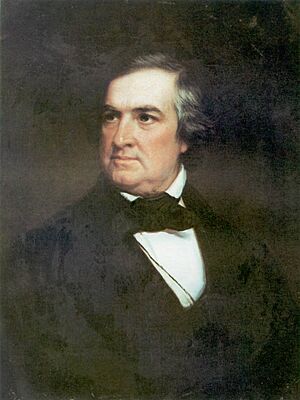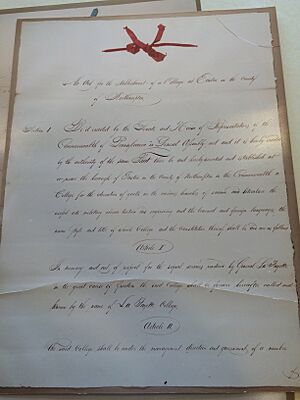James Madison Porter facts for kids
Quick facts for kids
James Porter
|
|
|---|---|
 |
|
| 18th United States Secretary of War | |
| In office March 8, 1843 – January 30, 1844 |
|
| President | John Tyler |
| Preceded by | John Spencer |
| Succeeded by | William Wilkins |
| Personal details | |
| Born | January 6, 1793 Norristown, Pennsylvania, U.S. |
| Died | November 11, 1862 (aged 69) Easton, Pennsylvania, U.S. |
| Political party | Democratic |
| Spouse | Eliza Michler |
James Madison Porter (born January 6, 1793 – died November 11, 1862) was an important American figure. He served as the 18th Secretary of War for the United States. He also helped create Lafayette College, a well-known school.
Porter started his career studying law in 1809. He later worked as a clerk and managed a volunteer army group. He became a lawyer in 1813. He also taught law at Lafayette College and was a judge. In 1843, President John Tyler chose him to be the U.S. Secretary of War. Later, he was elected to the Pennsylvania House of Representatives.
Contents
Early Life and Education
James Madison Porter was born on January 6, 1793. His family lived in Norristown, Pennsylvania, on an estate called Selma. He was the youngest of 13 children. His father, General Andrew Porter, was a hero from the American Revolution.
James and his older brother, Robert, learned at home when they were young. Later, they went to Norristown Academy for more schooling.
James Madison Porter's Career
Serving in the Military
Porter began his military journey in 1809. He worked as an office clerk for his father. His father was the Surveyor General of Pennsylvania at that time. This job helped him learn a lot about law.
In 1813, Porter was living in Philadelphia. Rumors spread that the British were coming during the War of 1812. Porter quickly organized groups of citizen soldiers along the Delaware River. The British never attacked, but people in Philadelphia praised his quick actions.
His military service paused when he moved to Easton, Pennsylvania in 1818. But it started again in 1843. President John Tyler appointed him as the Secretary of War. This job meant he was in charge of the country's military. Porter served for 11 months. The Senate did not officially approve his nomination. This was because President Tyler had a difficult relationship with the Senate. When Porter heard this, he resigned and went back to Easton.
Business Ventures
James Madison Porter is known for his political and school work. But he was also a successful businessman. He was the first president of a railroad company started in 1847. This company later became the famous Lehigh Valley Railroad. He also led the Belvidere Delaware Railroad company. This company is now part of the Pennsylvania Railroad.
Porter also led the Easton Delaware Bridge Company. Under his leadership, a railroad line opened in 1855. It went from Easton to Mauch Chunk, which is now called Jim Thorpe.
He also invested in natural resources. In 1817, he started a company to buy and work a slate quarry. This was near the Delaware River. By the 1830s, his company grew and was renamed the Pennsylvania Slate Company. Porter also invested in limestone quarries, coal mines, and iron ore mines.
He also started two other businesses. He founded the Dime Savings Institute of Easton, a savings bank. He also helped create the Farmers' and Mechanics' Institute of Easton. This group aimed to improve farming and mechanical skills.
Political Roles
In 1818, Porter moved to Easton. He became the deputy attorney general for Northampton County. He handled many civil and criminal cases there.
In 1838, Porter was elected to the Pennsylvania General Assembly. He helped to change the state's constitution. He led the committee that wrote the Bill of Rights. This allowed him to share his ideas. He had a balanced political view, not too extreme.
In 1839, his brother David Rittenhouse Porter became governor. That same year, David appointed James as a judge. He served as President Judge for several counties.
After serving as Secretary of War for President Tyler, Porter was elected to the Pennsylvania House of Representatives in 1849. However, he left after only one year. From 1853 to 1855, he was a President Judge again. He oversaw four different counties. Porter's political career ended when he was 63. He retired due to health reasons.
Starting Lafayette College
In the early 1800s, the town of Easton struggled to build good schools. A school built in 1755 closed in 1798. Another attempt in 1784 to create an academy also failed. The schools had trouble with buildings and keeping teachers. By 1824, the academy closed down.
Then, General Lafayette visited America in 1824-1825. This visit inspired the people of Easton. James Madison Porter met Lafayette in Philadelphia. They talked about Porter's family and war stories.
Inspired, Porter visited other colleges like Norwich University and Dartmouth College. This gave him the idea to start a college in Easton. People had tried before, but Porter believed Easton could support a college. He said Easton was "rich and flourishing" in people, location, and resources. He felt a college started by citizens would succeed.
A newspaper called The Centinal announced a meeting. Citizens were invited to discuss building a college. At the meeting, led by Porter, they talked about how a college could thrive. They believed a college would attract students from many places. This would make it stronger than local schools.
Porter also stressed the importance of teaching military science. He thought it would prepare young men for leadership. He also wanted German language taught, as many people in Easton had German heritage. Soon after, Porter and others wrote a charter for the college. A charter is like a permission document from the government.
On December 6, 1825, the Pennsylvania House of Representatives reviewed the charter. They debated it for a month. On January 6, 1826, the House passed the bill. They added three rules. These rules limited the college's power. They also allowed people of any religion to join. And the state could take back the charter if needed.
The bill went to the Pennsylvania Senate on January 16, 1826. Some senators did not like the idea of teaching military science. They thought it might encourage war. After two months, the Senate approved the charter on March 7, 1829. Two days later, Governor J. Andrew Shulze approved it. This is how Lafayette College officially began.
Many people helped Porter start the college. Some of them were:
- Samuel Sitgreaves, a lawyer and politician.
- Colonel Thomas McKeen, a military officer.
- Joel Jones, who later became mayor of Philadelphia.
- Colonel Christian Jacob Hutter, who started newspapers in Easton.
- Thomas J. Rogers, a writer and state senator.
These men joined Porter in Easton and on his trip to meet General Lafayette.
Speeches About Education
James Madison Porter gave important speeches. One was on July 4, 1832, to the students of Lafayette College. He was the President of the Board of Trustees at the time. He honored General Lafayette, for whom the college was named. Porter believed the college would be very successful.
He said that people who are not educated can never be truly "free." He thought that educated people would never be controlled by a bad government. Porter believed that schools like Lafayette College help Americans become smart and informed. He explained that Lafayette College started as a military school. It later became a liberal arts college, teaching many different subjects.
Porter also talked about young students. He said that young people are full of energy. But they might not always use their time wisely. He believed Lafayette College would help students succeed. They would become "ornaments of society." He stressed that learning and physical fitness were both important. He said that students who worked hard physically also made the most mental progress.
Porter finished his speech by saying that hard work is more important than just being smart. He told students that the college's reputation depended on their achievements. He wanted them to carry good morals and strong honesty into their adult lives.
Later Life and Legacy
James Madison Porter passed away on November 11, 1862. He was 69 years old. He died at his home in Easton, Pennsylvania. He is buried in Easton Cemetery with his wife, Eliza.
In 1997, Lafayette College created the Porter Society. This scholarship honors James Madison Porter and his work.
See also
 In Spanish: James Madison Porter para niños
In Spanish: James Madison Porter para niños
- Unsuccessful nominations to the Cabinet of the United States
 | Chris Smalls |
 | Fred Hampton |
 | Ralph Abernathy |


